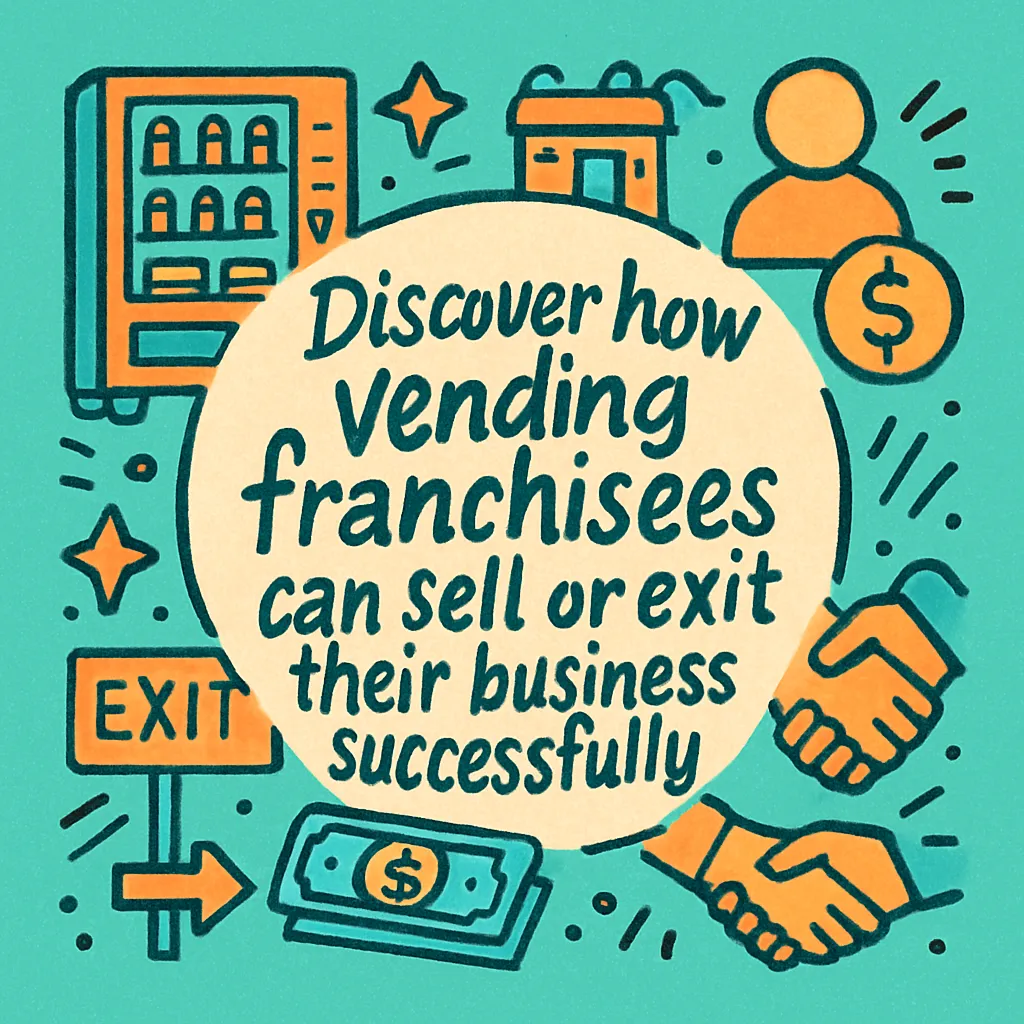Exit Strategies for Vending Franchise Owners
Discover how vending franchisees can sell or exit their business successfully.
Back to Vending Franchises ResourcesDiscover how vending franchisees can sell or exit their business successfully.
Back to Vending Franchises ResourcesStart your 30-day free trial and get instant SMS and email alerts whenever a local business needs vending service. These are real location leads to help you grow your route — you decide which ones to buy, no obligations or contracts.
![]() Maximize your business valuation for a profitable sale
Maximize your business valuation for a profitable sale
![]() Ensure a smooth transfer of ownership with proper planning
Ensure a smooth transfer of ownership with proper planning
![]() Navigate legal and franchisor requirements for a successful exit
Navigate legal and franchisor requirements for a successful exit
30 days free, then $39 / month.
No Commitment. Cancel Anytime.

For vending franchise owners, planning an exit strategy is as vital as the initial startup. It’s not just about selling a business; it’s about strategically maximizing its value and ensuring a seamless transition. Whether you’re looking to retire, pursue new ventures, or simply move on, understanding your options and preparing adequately will significantly impact your final outcome.
The most common exit strategy is selling the franchise. This involves preparing your business for sale, determining its value, and finding a suitable buyer. To maximize your sale price, focus on strengthening your business’s foundations. This includes securing high-performing vending machine locations with solid contracts, maintaining a modern and efficient fleet of machines, and demonstrating consistent profitability. Documenting your financial performance, inventory, and location agreements meticulously will be critical during due diligence. Working with a business broker specializing in franchise sales can also simplify this complex process.
Unlike independent vending businesses, franchise owners must adhere to their franchisor's specific terms regarding transfer of ownership. Typically, your franchise agreement will outline requirements for selling, including gaining franchisor approval, vetting prospective buyers, and potentially paying transfer fees. It’s essential to review these clauses early in your planning process to avoid unexpected delays or complications. Understanding how vending management works in franchise systems can also provide insight into maintaining brand compliance during a transition.
While selling is often the primary goal, other exit strategies exist. You might consider transitioning the business to a family member or key employee, which can offer a more gradual transfer of responsibilities. This requires careful planning for training, mentorship, and legal succession documents. Alternatively, if selling isn't feasible or desired, winding down the business is an option. This involves ceasing operations, not renewing location contracts, selling off individual vending machines, and liquidating remaining inventory. Each path has unique implications for your finances and involves different levels of effort and time commitment.
Timing your exit is crucial. A strong economy and consistent business performance can significantly increase your valuation. Engage with financial advisors or business valuators to get an accurate assessment of your franchise’s worth. They’ll look at key metrics such as annual revenue, profit margins, asset condition, and the strength of your location contracts. The clearer your financial records and the more robust your operational procedures, the more attractive your franchise will be to potential buyers, ensuring you leave your vending business on your own terms and with the greatest possible reward.
Vending Exchange connects vending operators with real businesses actively looking for vending services—including traditional machines, AI coolers, and office coffee. Get instant SMS and email alerts when new opportunities are available in your area. No contracts or monthly fees—just buy the leads you want. Start your free 30-day trial today and grow your vending business on your terms.
Common strategies include selling the franchise, passing it down to a family member, or winding down operations.
Valuation often considers factors like cash flow, machine age, location contracts, and potential for growth.
You'll need financial statements, machine maintenance records, location agreements, and inventory lists.
Typically, franchisor approval is required for any transfer of ownership, as per the franchise agreement.
A broker can help with valuation, marketing the business, screening buyers, and facilitating negotiations.
Improve operational efficiency, secure long-term location contracts, update machines, and demonstrate consistent profitability.
Tax implications can vary based on your business structure and sale price; consulting with a tax advisor is highly recommended.
This usually involves franchisor approval, legal documentation for the sale, and training for the new owner.
Yes, this may involve not renewing location contracts, selling off individual machines, and liquidating inventory.
It's advisable to start planning 3-5 years in advance to optimize your business for sale and ensure a smooth transition.